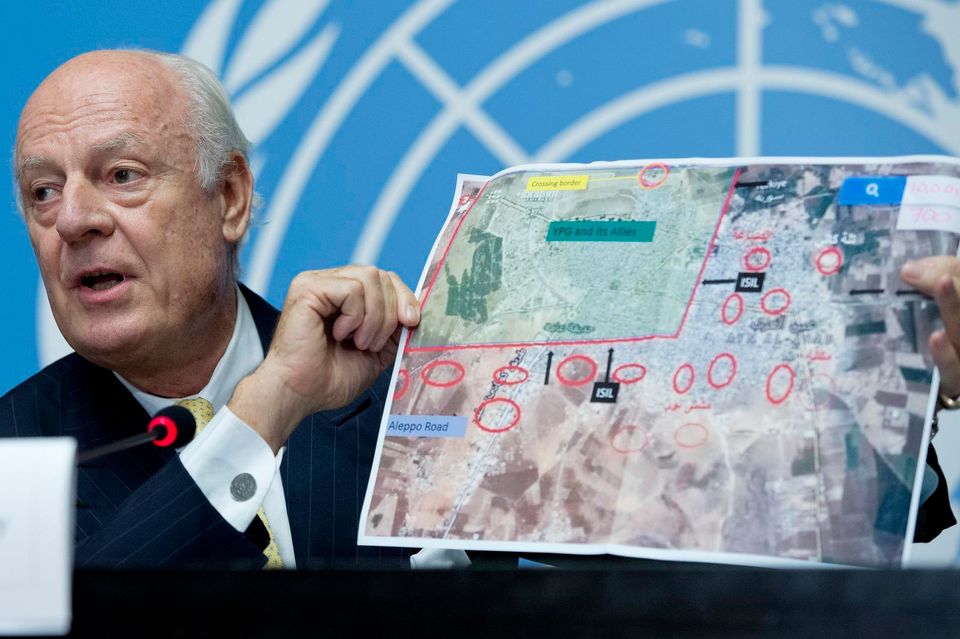
The International Community’s Gross Negligence in Syria
For anyone following the Syrian crisis, the news of the past two months has been tragic and has highlighted the international community’s gross negligence in protecting civilians and providing hope that justice will be a part of Syria’s future. In August, a chemical weapons report by the Organization for the Prohibition of Chemical Weapons-UN Joint Investigative Mechanism found that at least nine chemical weapons attacks were carried out in Syria in 2014 and 2015, naming the Syrian government and the Islamic State of Iraq and al-Sham (ISIS) as two of the perpetrators. The report confirmed many findings already known to the international community, but did not lead to subsequent action to hold perpetrators accountable or to pressure parties to the conflict to end their use of chemical weapons. Instead, the United States and Russia focused their attention on negotiating a nationwide ceasefire.
Today, it is unmistakably clear that the US-Russia brokered ceasefire has failed. It was clear when Russia reportedly attacked and destroyed a UN aid convoy on its way to deliver food, medicine, and other supplies to approximately 78,000 people in Aleppo. And it is even clearer as Russian and Syrian government forces have stepped up indiscriminate attacks and sieges on Aleppo, killing more than 400 people and leaving approximately 250,000 civilians trapped in the eastern part of the city. When an emergency session of the UN Security Council was called to address such attacks, the United States openly clashed with Russia, and the US, France, and Britain subsequently staged a walk-out when Syria’s ambassador was called to speak. Despite this demonstration and Secretary John Kerry’s fiery speech, the UN took no action afterwards on Syria. Although the ceasefire began with world leaders coming together to halt violence against civilians and to take direct military action against ISIS, the absence of a corresponding initiative in the ceasefire framework to hold violators accountable left the door wide open for violence to return and escalate.
These events and the many events preceding it illustrate the international community’s greatest failure in its response to the war: neglecting justice and accountability in discussions of short and long-term solutions to the conflict. Because of such neglect, the cycle of violence within the country has not only been allowed to continue, but to worsen, as perpetrators of violence on all sides feel free to continue their actions without fear of punishment. Had the international community shown a staunch commitment to holding those accountable for war crimes and human rights violations, particularly the chemical attacks described in the UN report, there would have been disincentives against violence erupting the extent to which it has today.
In light of such missteps, the international community should continue documentation efforts, including the UN-mandated Independent International Commission of Inquiry (COI) on the Syrian Arab Republic, which aims to investigate human rights abuses and contribute to accountability efforts. Because of the Commission’s work, a June 2016 report confirmed that ISIS had committed genocide against the Yazidi people in Syria. The only reason the Commission did not prosecute is because there is yet “no path to international criminal justice available.” When there is political will, however, commission of inquiry investigations have led to criminal action. In 2005, the Commission of Inquiry on Darfur’s investigation led to recommendations that the UN Security Council used to refer the case to the International Criminal Court (ICC), opening the door for accountability in Sudan (which has not yet successfully prosecuted President Omar al-Bashir but contributed to limiting the violence).
If the UN is going to establish such investigative bodies within Syria, it needs to utilize them properly during discussions for peace and reconciliation. This ensures that such discussions are meaningful and that all parties are equipped with the information necessary to present sound and fully developed solutions to end the war.
Violence has escalated partly because of the international community’s failure to include justice and accountability measures in its solutions for Syria. Now, with little to no hope in sight for peacefully ending the war, world leaders must look inward to examine the mistakes that exacerbated the conflict. Had leaders been firmly committed to combatting injustice, there may have been a reduction in indiscriminate attacks on civilians and other atrocities. Instead, international leaders accommodated the violence of Russia and the Syrian government in order to conduct strikes against ISIS and Jabhat al Nusra; did not take a strong stance against Syria’s policy of forced population transfers and sieges; entered into ceasefire agreements without clear maps or accountability measures that would protect civilians; and overlooked the atrocities of rebel groups and Kurdish forces when liberating ISIS-controlled areas. These examples are just a sampling of the international community’s missteps.
Though the past cannot be changed, moving forward, world leaders’ application of transitional justice frameworks in their peacebuilding efforts is the key to conflict resolution. Without this, any and all future strategies are destined for failure.
For more information or to provide feedback, please email SJAC at [email protected].